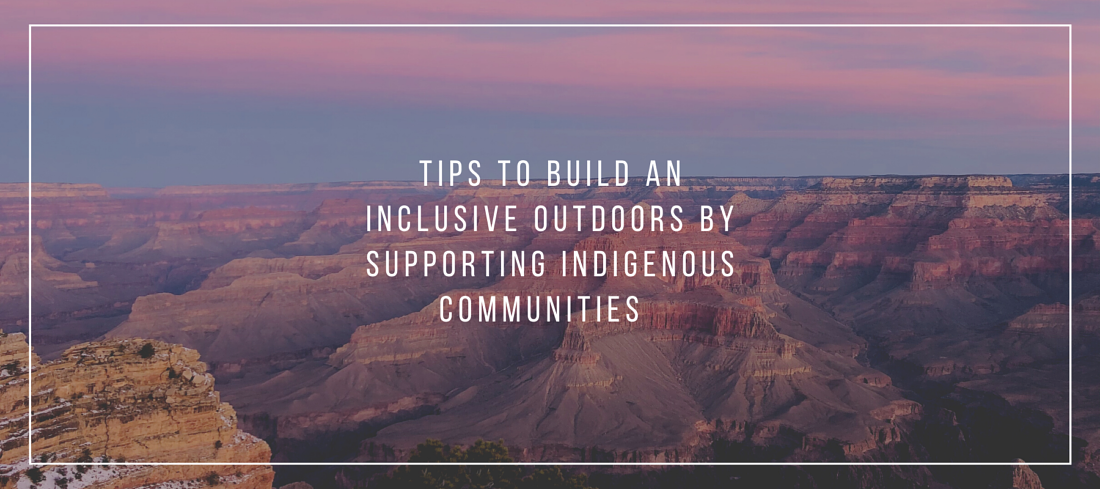TIPS TO BUILD AN INCLUSIVE OUTDOORS: START BY SUPPORTING INDIGENOUS COMMUNITIES
September 26th marks the annual holiday to celebrate America’s public lands.

Posted on Thu 24 Sep 2020 · by Elle Biesemeyer
September 26th marks the annual holiday to celebrate America’s public lands. As we celebrate and show our gratitude on National Public Lands Day, though, we cannot ignore the history of the land on which we recreate. Below you will find our Tips to Build an Inclusive Outdoors: Start by Supporting Indigenous Communities.
As part of building an inclusive outdoors it is important to remember we are all on Indigenous land. As we enjoy the outdoors this summer, it is important to have a purposeful understanding of the land we recreate upon. Settler colonialism, the ongoing process that works to forcefully replace Indigenous people and societies with settlers’, is vital to this understanding. The United States is a settler colonial state, founded on the genocide of Indigenous people that continues in various ways today. So how can we incorporate this knowledge into our practice as adventurous women in the outdoors? Here are five ways we can start building an inclusive outdoors by supporting Indigenous communities.
1. EDUCATE OURSELVES ON A LOCAL LEVEL
Decolonization is integral to social and racial justice in the United States. As a white person residing on the ancestral lands of the Atfalati, Cowlitz, and Kalapuya people, I have immense settler privilege. Find out whose land you occupy using this interactive map and proceed to research the tribes’ history. AdventurUs Women is centered in the LA Area, the ancestral homelands of the Gabrielino/Tongva and Tataviam people.
2. ACKNOWLEDGE THE LAND
Maybe you’ve heard of land acknowledgements or noticed a little red pin in an Instagram caption of your favorite outdoor instagram stating whose ancestral land the photo was taken on. Land acknowledgements are a first step to resist the settler colonial structure and act in solidarity with the Indigenous people who engage in continuous resistance against settler colonialism.
Here is a thoughtful, extensive guide to land acknowledgements by the Native Governance Center. Land acknowledgements celebrate the vitality of the Indigenous people who are the rightful stewards of the lands we reside and recreate upon. They challenge the myth perpetuated within the settler colonial societies that Indigenous people no longer exist.
When you go to post that photo of the beautiful peak you just climbed or your lakeside campsite, let your followers know whose land it was taken on. Normalize land acknowledgements and encourage your friends and family to use them, too. To build an inclusive outdoors, we need to work from within our own communities, first.
3. KNOW THE NAME
Ask yourself: what are the Indigenous names for the landmarks around you? Systematic re-naming and mis-naming is part of the legacy of settler colonialism. In my hometown of Portland, Oregon, everyone who loves the outdoors flocks to Wy’East, known as Mt. Hood. Wy’East is a mountain on the ancestral homelands of the Multnomah people.
When you venture into the outdoors, ask yourself about the names of the landmarks around you. Where did the Indigenous word come from? What is the correct pronunciation? Who renamed it? When? Why?
When considering these Indigenous names, it is also important to understand that there are many different Indigenous people who reside in the same areas. There might be multiple names for the same landmark–decolonization is messy. Unlearning and relearning Indigenous names is essential to realizing that our own understanding of borders and land are not natural but ingrained by settler colonialism. Check out this OPB podcast and article on the rightful renaming of outdoor landmarks including Denali and Wy’East.
4. RESEARCH THE INDIGENOUS HISTORY AND LEGACY OF OUR DESTINATIONS
We often relish in the seemingly untouched quality of the outdoors. We perceive public lands as our playgrounds, wild and rugged. But public lands do not really belong to the public. Nor are they as wild as we have been led to believe. The settler’s idyllic experience in the outdoors intertwines with the traumatic history of violent displacement for Indigenous people.
The Nüümü Poyo (or “John Muir Trail” as you may know it), is an ancestral trade route for the Paiute people that runs through the Sierra Nevada. Figures like John Muir erased the history of the trail and land and turned it into public lands, all while forcefully removing Indigenous people. Read the article “Hiking the Nüümü Poyo: An Act of Love by Indigenous Women” to read more about the history of the trail and ways Indigenous folks are working to reclaim it.
https://www.instagram.com/p/Bz6NwpoFaoA/?utm_source=ig_embed&ig_rid=95206863-2774-4e66-a145-5833b5f9e99f
When you travel—no matter how far—look into educational and cultural preservation work led by Indigenous folks. Are there heritage sites you can visit? Is there ongoing work to support their sovereignty? How does your presence impact their lives?
If the subject of public lands and Indigenous sovereignty interests you, check out the book Dispossessing the Wilderness: Indian Removal and the Making of National Parks by Mark David Spence.
5. SUPPORT THE WORK OF THE PEOPLE WHOSE LAND WE OCCUPY
Our solidarity should not stop with a land acknowledgement. Decolonization means Indigenous sovereignty, it means sacrificing settler privilege. Support the work of the tribes in your area monetarily and by advocating for their self-determination. Contribute to projects that push for land to be returned to Indigenous groups in your area and nationally. Recently, land in Big Sur, California was returned to Esselen Tribe—this should be a regular, ongoing occurrence that we have the power to activate.
Just as we study the flora and fauna of the lands that bring us so much joy, we too should also study the history of these lands and the Indigenous people who called these lands home.
Header Photo taken on the ancestral lands of the Havasupai, Hopi, Hualapai, Kaibab, Moapa, Navaho, Paiute, Zuni, and Yavapai-Apache.